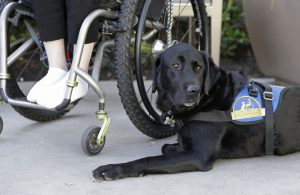The University of New Haven welcomes canine friends in their community to accompany those with disabilities.

An email was sent out by Linda Copeny-Okeke, director of Campus Access Services, last week to members of the University of New Haven’s campus community reminding everyone that UNH is covered under Title III of the American Rehabilitation Act as a place of public accommodation. This means that service animals are permitted to go anywhere that the public is permitted to go.
“We also strive to be inclusive of all members of the community,” said Copeny-Okeke in her email.
The U.S. Department of Justice’s American Disabilities Act states that a service animal is “a dog that is individually trained to do work or perform tasks for people with disabilities.”
The email also stated new regulations to follow, should a member of this community encounter a service animal.
First, only two questions may be asked of someone who is using a service animal—is the dog a service animal required because of a disability, and what work or task has the dog been trained to perform?
Students, faculty, or staff members can not ask any other questions regarding the service animal, including questions about the person’s disability, medical documentation, special identification, or have the dog demonstrate it’s work.
Second, the dog must be harnessed, leashed, or tethered and may only be asked to leave if it is out of control or not house broken.
Third, allergies or fear of dogs are not excuses for asking a dog to leave.
Professor Jenny Lazar of UNH’s Department of Communications, Film, and Media Studies said that although she hasn’t had a service animal in class, she supports the use of them.
“There is evidence that animals promote and enhance learning and have a calming effect on most people,” Lazar said.
Likewise, the majority of the members of the UNH community are also in support of having service animals on campus.
Graduate student Lauren Kocivar said that “Service Animals are welcome at UNH because they give people with disabilities an equal opportunity to learn and take advantage of all the great things here.”
Although most people have not encountered one, the general opinion is that if they are making life easier for someone with a disability, then service animals are a positive asset to this campus.










